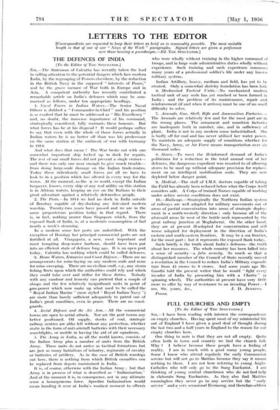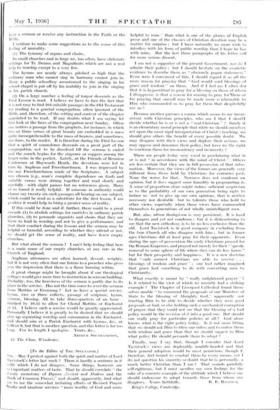FULL CHURCHES AND EMPTY
[To the Editor of THE SPECTATOR.] SIR,-1 have been reading with interest the correspondence on empty churches. Having spent most of my ministerial life out of England I have given a good deal of thought during the last two and a half years in England to the reason for our empty churches here.
One thing to note is that they are not all empty. Quite often both in town and country we find the church full. Why ? I believe because these people have a feeling of reality. I am in touch with a good many young people. Some I know who attend regularly the early Communion service but will not go. to Mattins because they say it means nothing to them. I am not here referring to young Anglo- Catholics who will • only go to the Sung Eucharist. I am thinking of young central churchmen who do- not find help in elaborate Sung Eucharists. As they also find Mattins meaningless they, never go to any service but the early service and a very occasional EVensong,-and therefore seldom
hear a sermon or receive any instruction in the Faith or the Bible.
I venture to make some suggestions as to the cause of this feeling of unreality.
(1) The tyranny of organs and choirs.
In small churches and in large we, too often, have elaborate settings for Te Deums and Magnifieats which are not a red help to worship except to a very few.
The hymns are nearly always pitched so high that the ordinary man who cannot sing in harmony cannot join in. Many a public schoolboy accustomed to the singing in his .,•hool chapel is put off by his inability to join in the singing ill his parish church.
(2) On a large number a feeling of torpor descends as the First Lesson is read. I believe we have to face the fact that it is not easy to find 104 suitable passages in the Old Testament for reading to a general congregation, often ignorant of the Bible, and, therefore, of the setting and context of the chapter appointed to be read. If any doubts what I am saying let him look at the faces of the congregation next Sunday. Often one notices a passage from the prophets, for instance, in which two or three verses of great beauty are embedded in a mass quite incomprehensible to the mass of hearers, and sometimes, one fears, to the reader. It is therefore during the First Lesson that a spirit of somnolence descends on a great part of the congregation, not to be dissolved till the sermon is ended and the search begins for the sixpence or coppers•among the larger coins in the pocket. Lately, at the Friends of Reunion Conference at Haywards Heath, the devotions were led in turn by •Anglican and Freechurchmen. I was impressed by the use Freechurchmen made of the Scriptures. A subject was chosen (e.g., man's complete dependence on God) and suitable verses were strung together and read slowly and carefully—with slight pauses but no references given. Many of us found it really helpful. If someone in authority could choose say twenty-six such passages all bearing on one subject, which could be read as a substitute for the first lesson, I am positive it would help to bring a greater sense of reality.
If this could be done and if, further, there could be a great. crusade (1) to abolish settings for canticles in ordinary parish churches, (2) to persuade organists and choirs that they are there to lead in worship and not to give a performance, and that their conduct during the lessons and the sermon may be helpful or harmful, according to whether they attend or not, we should get the sense of reality, and have fewer empty churches.
But what about the sermon I can't help feeling that here is a main cause of our empty churches, at any rate in the Church of England.
Anglican utterances are often learned, devout, weighty. but it is not very often that one listens to a preacher who gives you the impression that there is a flame burning within.
A great change might be brought about if our theological colleges would give more time to instruction in sermon building. Probably, too, the heaviness of the sermon is partly due to its place in the service. Has not the time come to sever the sermon from Mattins or Evensong ? Let us have a special service, hymn, two or three collects, passage of scripture, hymn, -canon, blessing. All to take three-quarters of an lour--- finished by 10.45 to allow for Choral Mullins or Eucharist it 11. I believe such a service would be greatly appreciated. Personally I believe it is greatly to be desired that we should give up separating worship and communion in the Eucharist, and should aim at a Parish Eucharist with hymns, &c., at 8.30 or 9, but that is another question, and this letter is far too long. For its length I apologise.—Yours, &c., 11 The Close, Winchester.
ARTHUR SOUTHAMPTON.















































 Previous page
Previous page